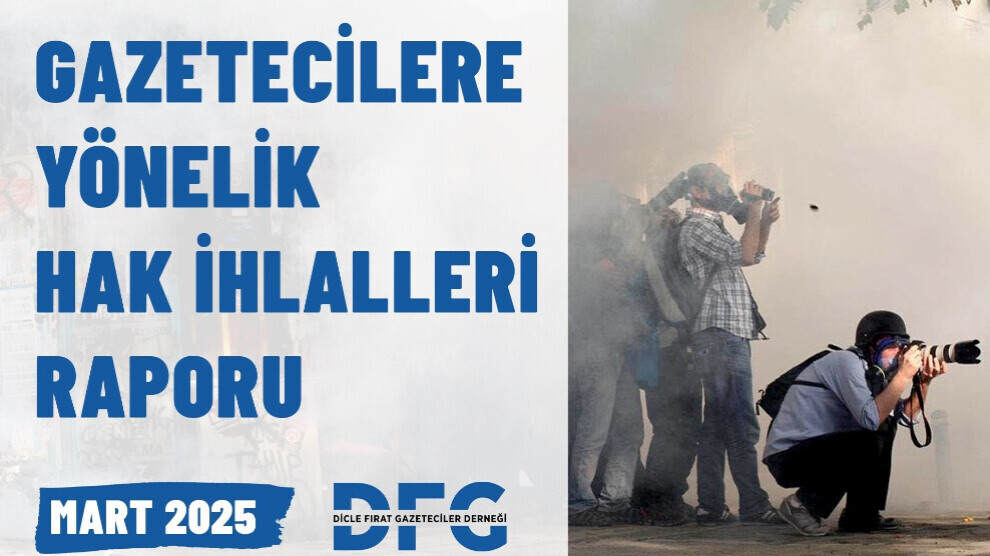DFG March report: 21 journalists taken into custody, 8 sent to prison
The Dicle Fırat Journalists Association reported widespread rights violations against journalists in March, including detentions, arrests, violence, and deportations.
The Dicle Fırat Journalists Association reported widespread rights violations against journalists in March, including detentions, arrests, violence, and deportations.

The Dicle Fırat Journalists Association (DFG) has published its "March 2025 Report on Rights Violations Against Journalists." The report underlined that "in March, journalism was squeezed by economic pressure and simultaneously targeted through detentions, arrests, and physical attacks. The data revealed regarding the violations against journalists throughout the month has left a dark stain on Turkey’s record of press freedom."
The report also highlighted media outlets that were forced to shut down or downsize due to economic difficulties. It stated: "The increasingly burdensome conditions imposed by the Press Advertisement Agency (BIK) on online news platforms, along with recent changes to Google’s algorithms, continue to strain independent media. While the government’s economic policies tighten their grip on press institutions, following the downsizing of Artı Gerçek, Medyascope, and 10 Haber, Gazete Duvar also announced its closure. Likewise, Voice of America was shut down following a request by Donald Trump."
The report noted that despite all economic hardship, journalists have continued to carry out their profession and have been subjected to attacks while doing so. It stated: "On 19 March, following the detention and subsequent arrest of Istanbul Metropolitan Municipality Mayor Ekrem Imamoğlu, mass protests erupted across the city. Police responded with disproportionate and brutal force. During these interventions, 17 journalists were subjected to physical violence and mistreatment. Journalists attempting to cover the events were arbitrarily prevented from doing their work.
In March, 21 journalists were detained, 17 of them for covering public protests. On 24 March, journalists Yasin Akgül, Ali Onur Tosun, Bülent Kılıç, Zeynep Kuray, Kurtuluş Arı, Gökhan Kam, and reporter Hayri Tunç were detained in Istanbul. Initially released under judicial control, they were later arrested after the prosecutor reversed the decision. This abrupt change was widely interpreted as the result of ‘orders from above.’ Following public backlash, the journalists were released two days later. Eight journalists, including Swedish reporter Joakim Medin, were imprisoned in March. Journalist Ismail Saymaz was placed under house arrest.
The government, in its effort to suppress public outrage by force, has effectively declared war on journalists reporting from the streets."
The report added: "The Radio and Television Supreme Council (RTUK) halted broadcasts under the threat of censorship, while journalists and media outlets attempting to convey the voice of the streets to the world had their social media accounts shut down. Social media accounts belonging to youth organizations expressing democratic opposition, legal groups exposing torture and rights violations, and women’s organizations resisting all forms of gender-based violence and femicide were also targeted and removed. Three foreign journalists who covered both the Newroz celebrations and the protests in Saraçhane were deported, and one of them was arrested."
The report continued: "Acting like Goebbels during the Hitler era, the head of RTUK first threatened the channels that aired footage of the protests. He then imposed a 10-day blackout on one station and issued fines and suspension penalties for 18 programs across four other channels. The platform X (formerly Twitter) announced that Turkey had demanded access restrictions on 700 accounts. Among them, DFG identified 269 accounts belonging to journalists, youth, and women’s organizations. Including individual accounts, the total number is estimated to exceed 700. During this process, the X account of Bianet and the Instagram account of Mezopotamya Agency were removed. Additionally, the First Criminal Judgeship of Peace in Adiyaman ruled to block access to Mezopotamya Agency’s website. In March alone, access to three websites and six individual news articles was restricted.
As the government continues its assault on freedom of thought, expression, and the press, the overall picture grows even darker. Yet despite all this darkness, journalists have remained at their posts, committed to reporting the truth. We once again declare: No power can obscure the truth. Journalism cannot be put on trial.’"